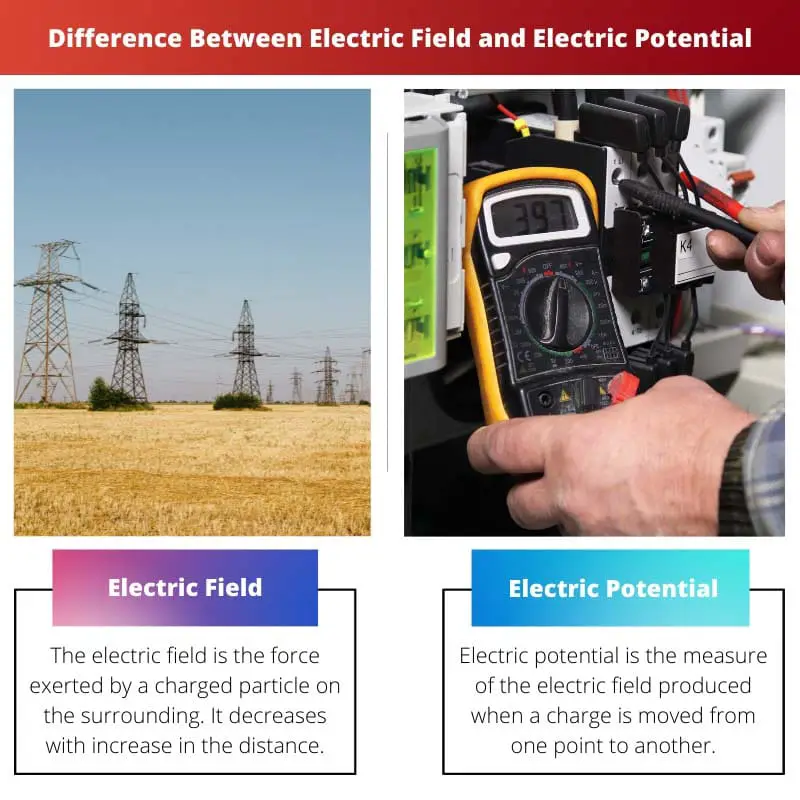An electric current is formed when two charged particles are brought close to each other. Depending on the charges present, the flow of the current is described.
The electric current can be measured using various measurements and units. These units and measurements are defined and formulated to help determine the electric current’s value.
Two of them being electric field and electric potential.
Key Takeaways
- An electric field is a vector quantity representing the force exerted on a charged particle within the field, providing information about the direction and magnitude of the force experienced by a charged particle.
- Electric potential, also known as voltage, is a scalar quantity that measures the potential energy per unit charge at a particular point in space, indicating the amount of work required to move a charged particle within an electric field.
- The primary difference between electric field and electric potential is their nature. The electric field is a vector quantity representing the force on a charged particle, and electric potential is a scalar quantity that measures the potential energy per unit charge.
Electric Field vs. Electric Potential
An electric field is a vector quantity. It is the area around charged particles and the force charged particles apply to their surroundings. Electric potential is a scalar quantity. It is the force necessary to move charged particles in an electric field from one point to another.

An electric field is the measure of the force exerted by charged particles. Every charged particle has an electric field, which decreases with an increase in the distance between the particle and the point where the force is being measured.
An electric potential, on the other hand, is the measure of the electric field of a particle. The electric potential also decreases with an increase in distance.
The unit of measurement is Volt.
Comparison Table
| Parameters of Comparison | Electric Field | Electric Potential |
|---|---|---|
| Definition | The amount of force per charge | The amount of energy per charge |
| Magnitude | Vector quantity | Scalar quantity |
| Units | Newtons per coulomb | Volt |
| Measurement | A measure of the force exerted by the charged particles on the surrounding | A measure of the electric field |
| Continuity | Is not always continuous but is never infinity | Is always continuous |
| Relation with distance | Decreases with the increase in distance | Decreases with the increase in the square of the distance |
What is Electric Field?
The electric field is the force a charged particle exerts on the surrounding. It decreases with an increase in the distance.
This is because the further the point is from the charged particle, the lesser the force exerted. The force exerted can be positive or negative depending on the particle’s charge.
The formula for calculating the electric field is usually,
E=F/q or E=Kq/r^2
Where,
- E=electric field
- F=force exerted
- Q=charge of the particle
- r=distance of the charge
- K=constant
From the formula, we obtain the electric field unit to be Newton per Coulomb(N/C), and the SI unit of an electric field is volt per meter(V/m). According to the unit, we can also define the electric field as the force exerted per unit charge.
An electric field is also described as the physical field or area around every charged particle and measures the area up to which the force is being exerted. The charged particle exerts a repulsive or attractive force on other nearby charged particles.
This is a vector quantity.

What is Electric Potential?
Electric potential is the measure of the electric field produced when a charge is moved from one point to another. It is also described as the energy or work done on moving a unit charge from infinity to a point on the electric field when the acceleration of the particle is zero.
The formula for electric potential is,
V=W/Q or V=Kq/r
Where,
- V=electric potential
- W=work done
- Q,q=charge
- r=distance
- K=constant
From the formula, we can derive the unit of electric potential as joules per coulomb (J/C), but the SI unit of electric potential is volt(V). We can define electric potential from the units as the energy or work done per unit charge.
The formula for electric potential changes with a change like the charged particle and the shape of the solid for which the potential is to be determined.
This is a scalar quantity.

Difference Between Electric Field and Electric Potential
- The definition is the main difference between the electric field and the electric potential. The electric field is the force exerted per unit charged particle, whereas the electric potential is the energy or work done per charged particle.
- Since the electric field depends on the direction of the force exerted, it is a vector quantity. But this is not the case in electric potential as it is independent of the direction of the charged particle or the force and remains a scalar quantity.
- The formulas for calculating the two measurements are different; therefore, there is a difference in the SI units of the two. The SI unit of an electric field is volt per meter or V/m, whereas the SI unit of electric potential is volt or simply V.
- As the definitions suggest, the electric field measures the force exerted per charged particle. The electric potential measures the electric field per charged particle or the work done(or energy used).
- The electric potential is always a continuous function, whereas the electric field is not a continuous function. It varies from region to region or point to point as it also depends on the particle the force is being exerted. But the value never tends to infinity.
- As the force exerted decreases with increased distance between the charged particles or the point and the charged particle, the electric field is inversely proportional to the distance. On the other hand, the electric potential is inversely proportional to the square of the distance(distance between the initial and final point).

- https://science.sciencemag.org/content/218/4571/467.abstract
- https://agupubs.onlinelibrary.wiley.com/doi/abs/10.1029/2002JA009429

A well-crafted article elucidating the intricacies of electric potential and electric field. The detailed comparison enhances the reader’s comprehension of these concepts.
Informative and well-researched article, offering a comprehensive comparison of electric potential and electric field that will benefit those seeking clarity on the matter.
A precise and insightful explanation of electric potential and electric field, allowing readers to deepen their knowledge in this area of physics.
The article offers a comprehensive understanding of electric potential and electric field, making it beneficial for readers to comprehend the intricacies of these subjects.
The material provides a practical summary of electric potential and electric field, facilitating a better understanding of these fundamental principles.
The article is a helpful guide to understanding electric potential and electric field, making it easier for readers to distinguish between the two.
The article does an excellent job of breaking down the complex concepts of electric potential and electric field in an understandable manner. Well-written and informative.
The article provides a clear and concise comparison between electric field and electric potential, aiding readers to grasp the distinctions between these two crucial concepts in physics.
The article delivers an insightful and thorough exploration of electric potential and electric field, aiding readers in acquiring a solid grasp of the topic.
The article presents an excellent and informative analysis of electric potential and electric field, providing readers with valuable insights into these concepts.